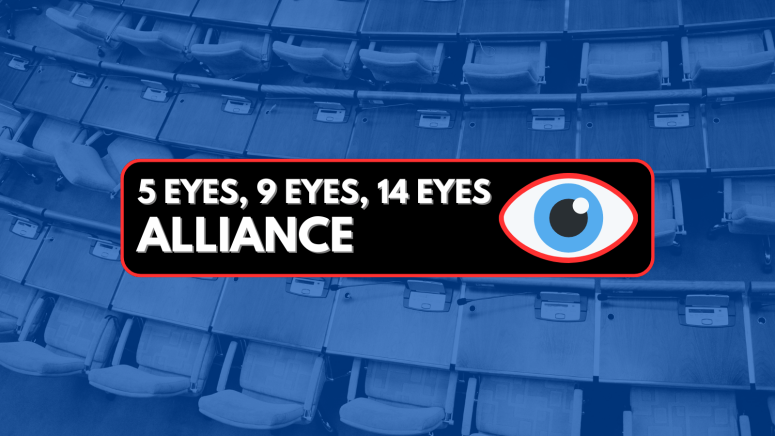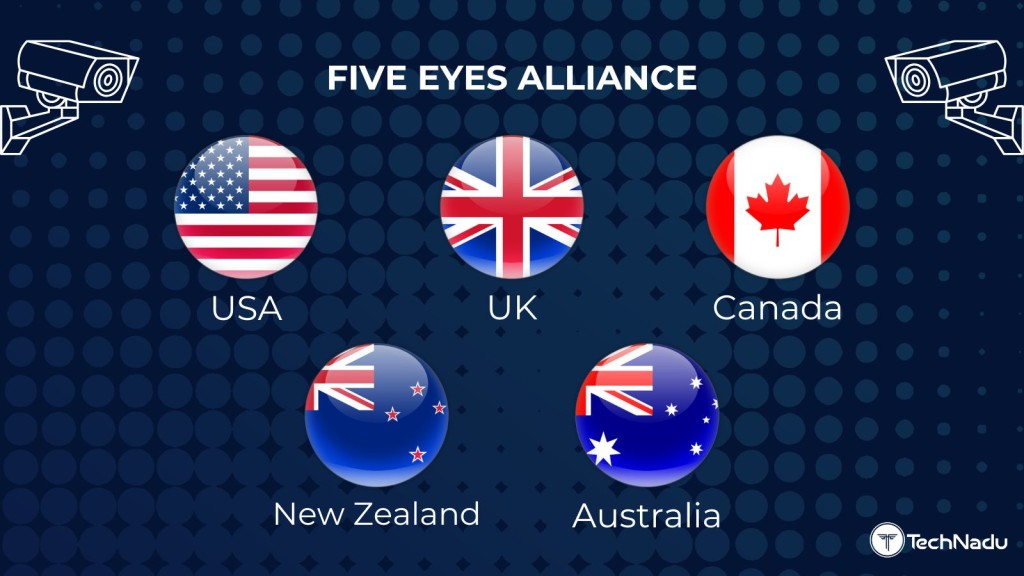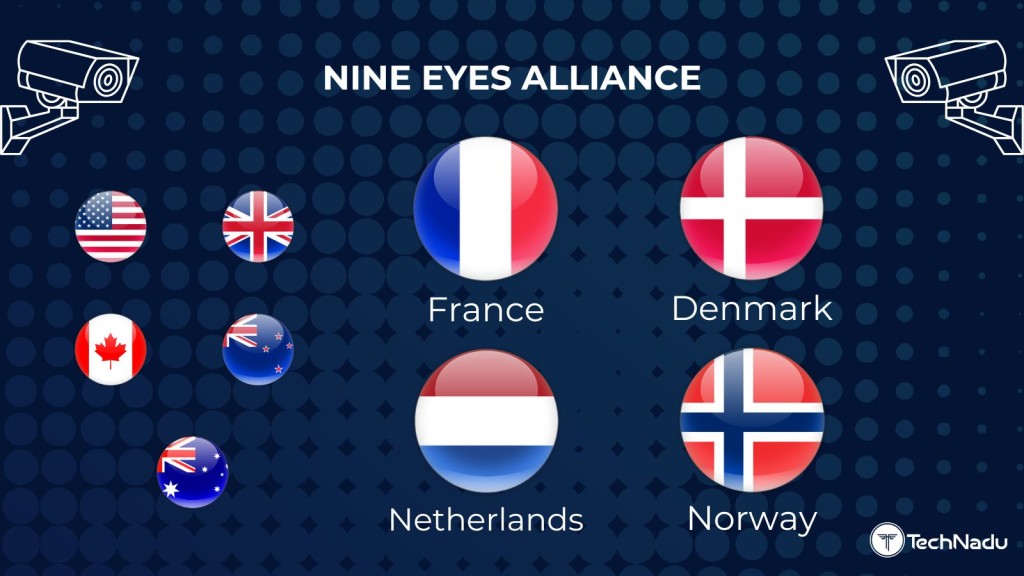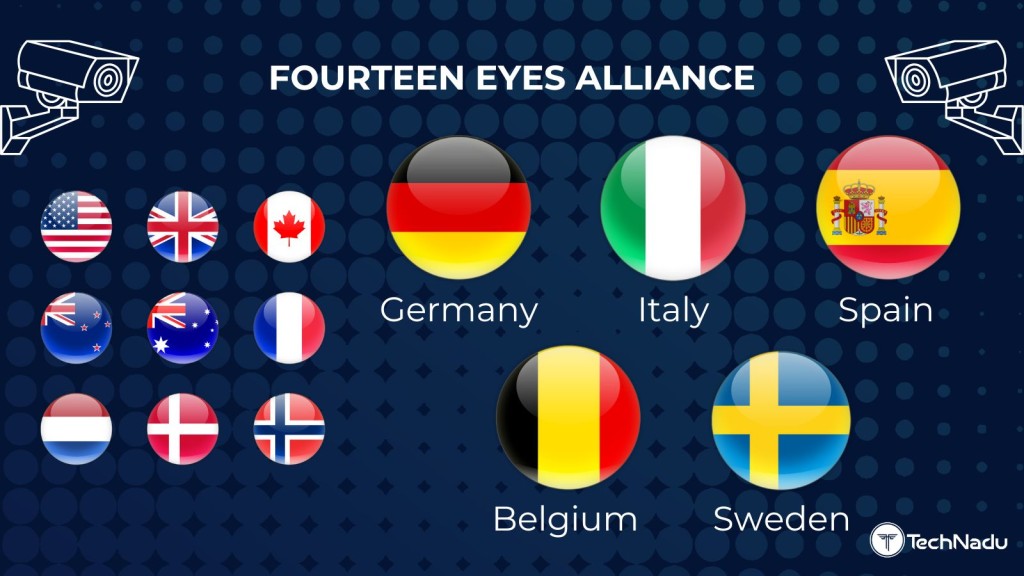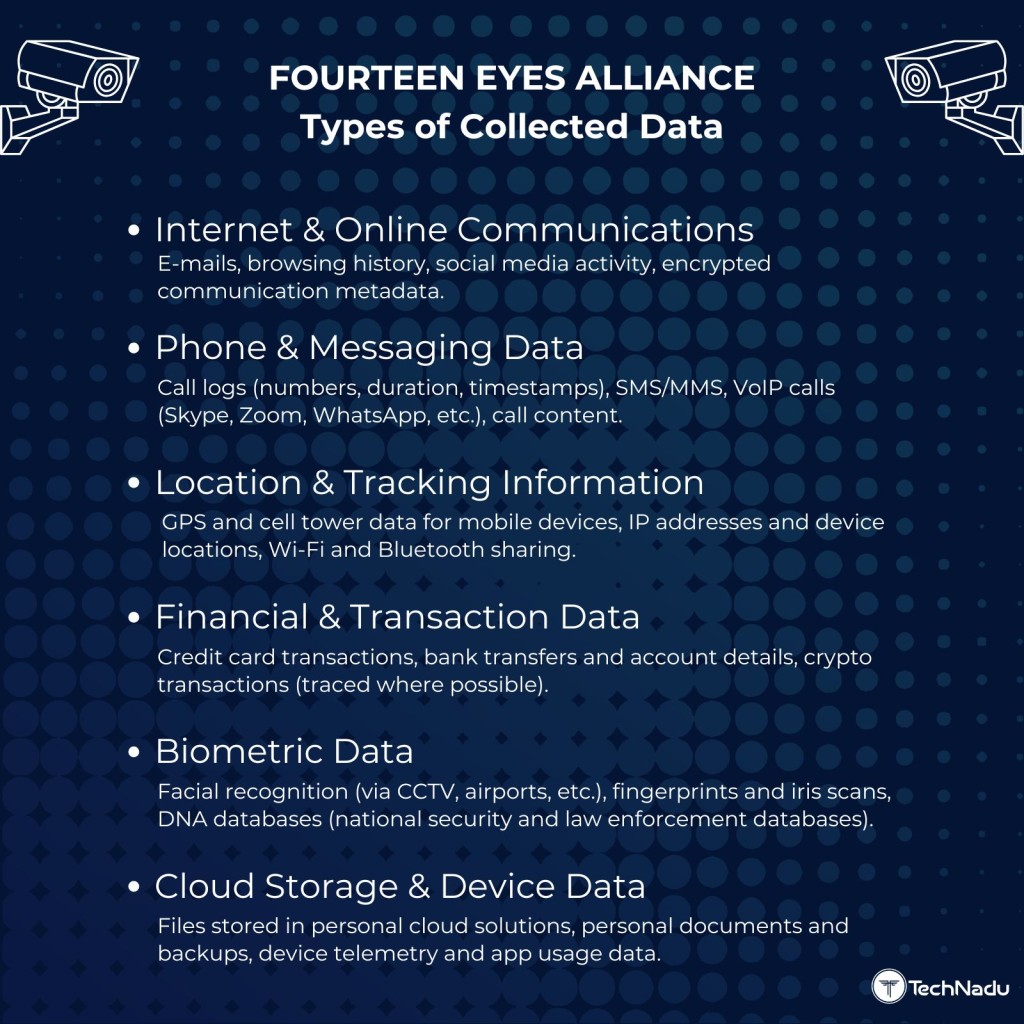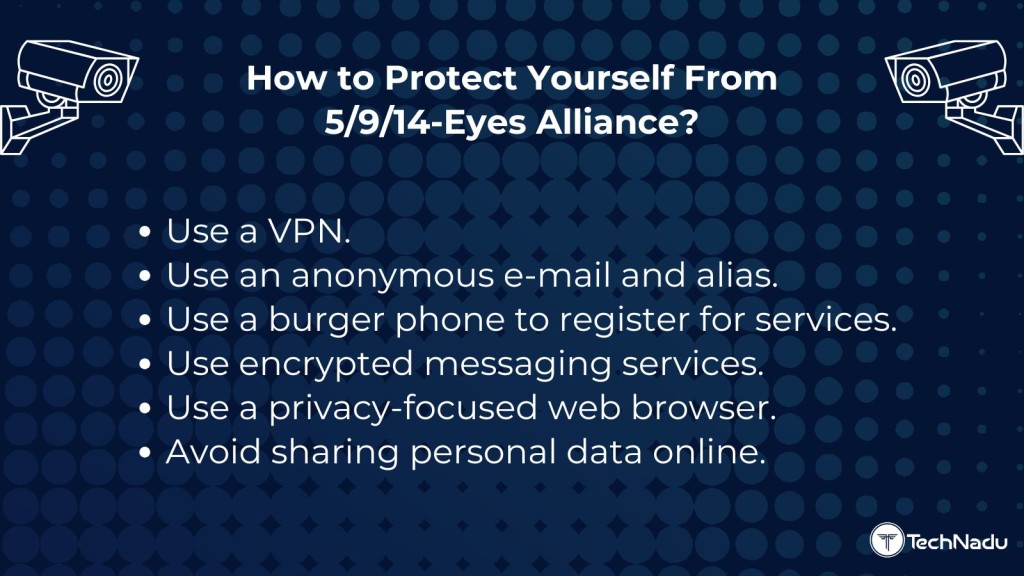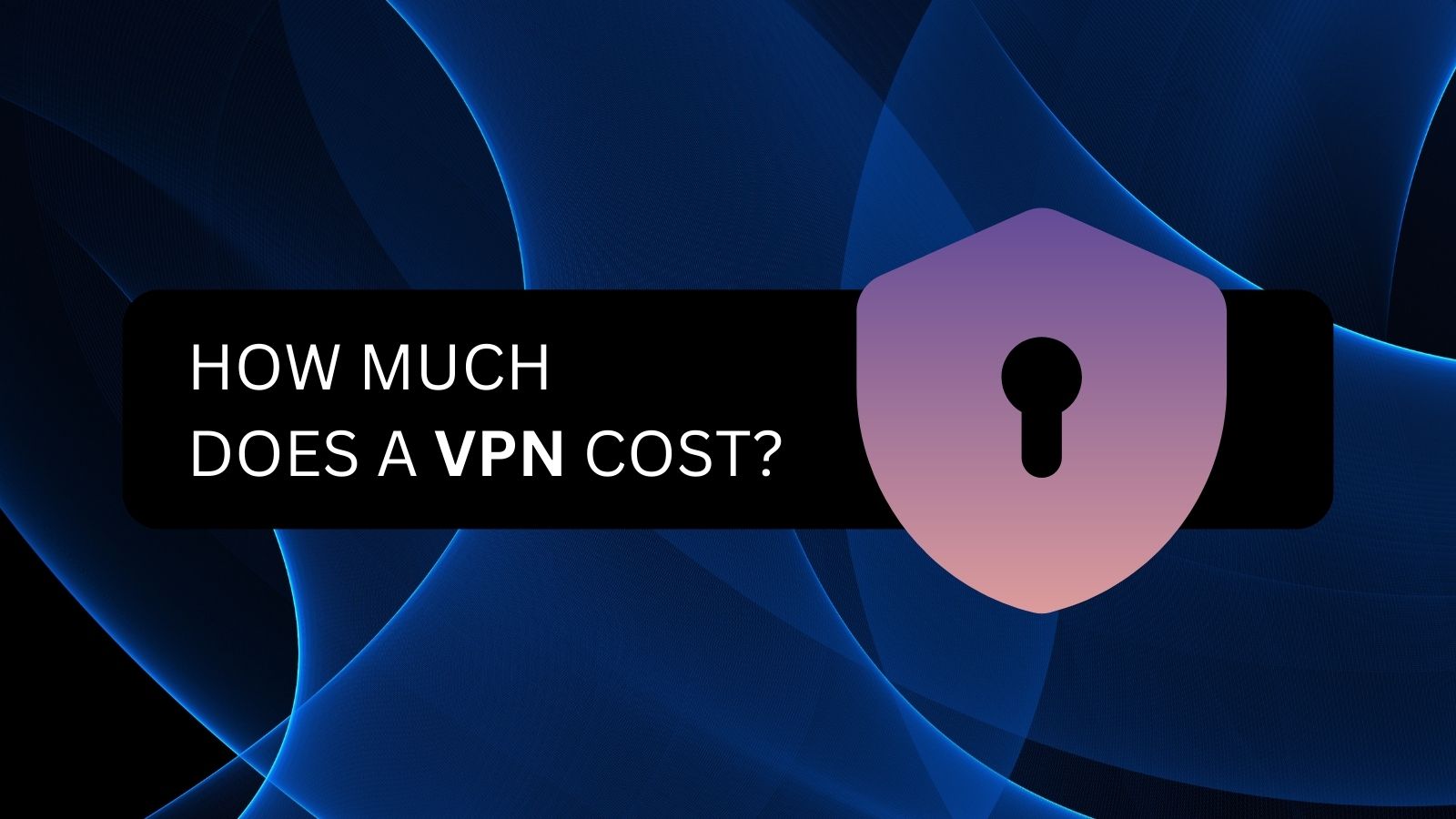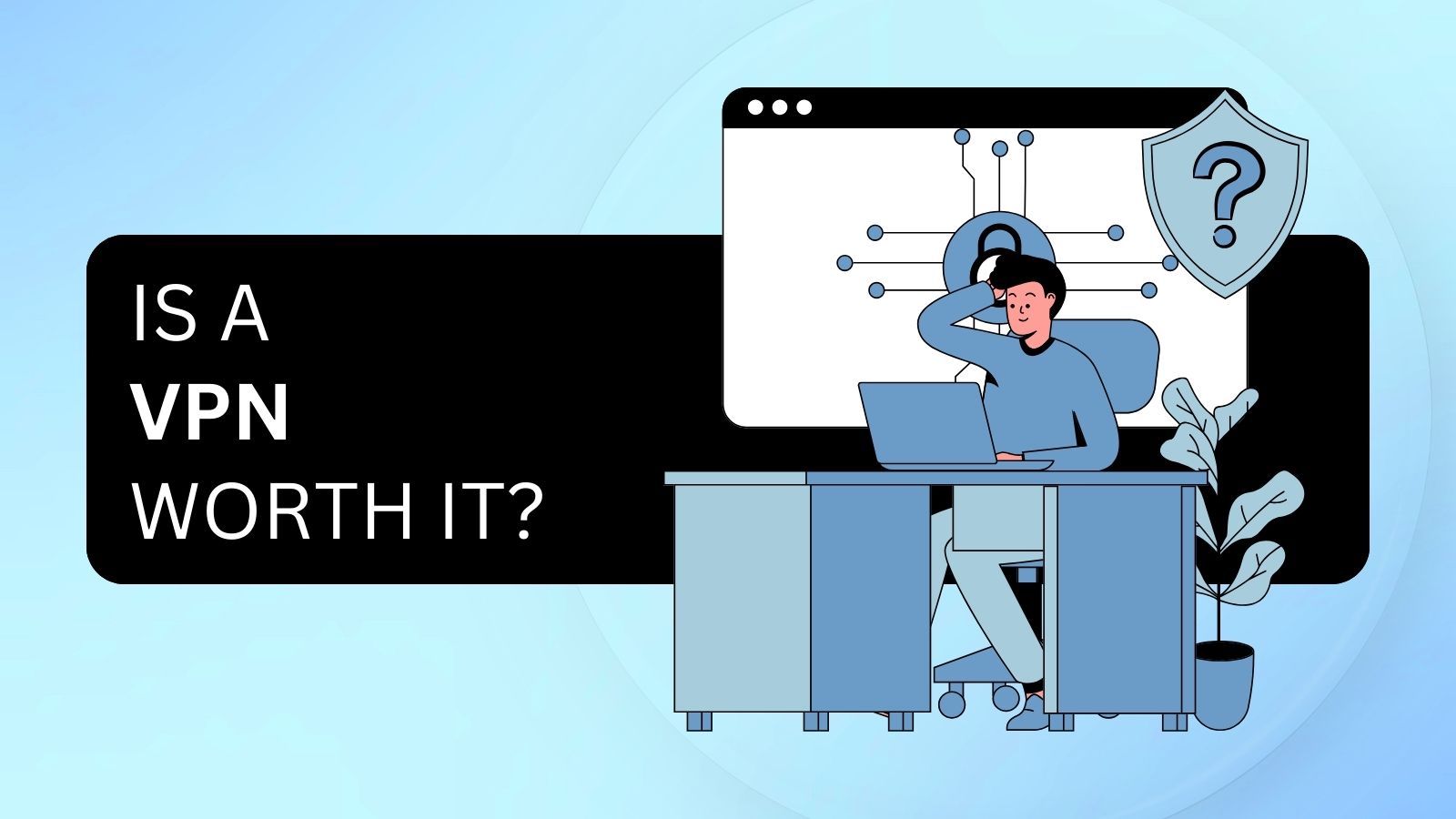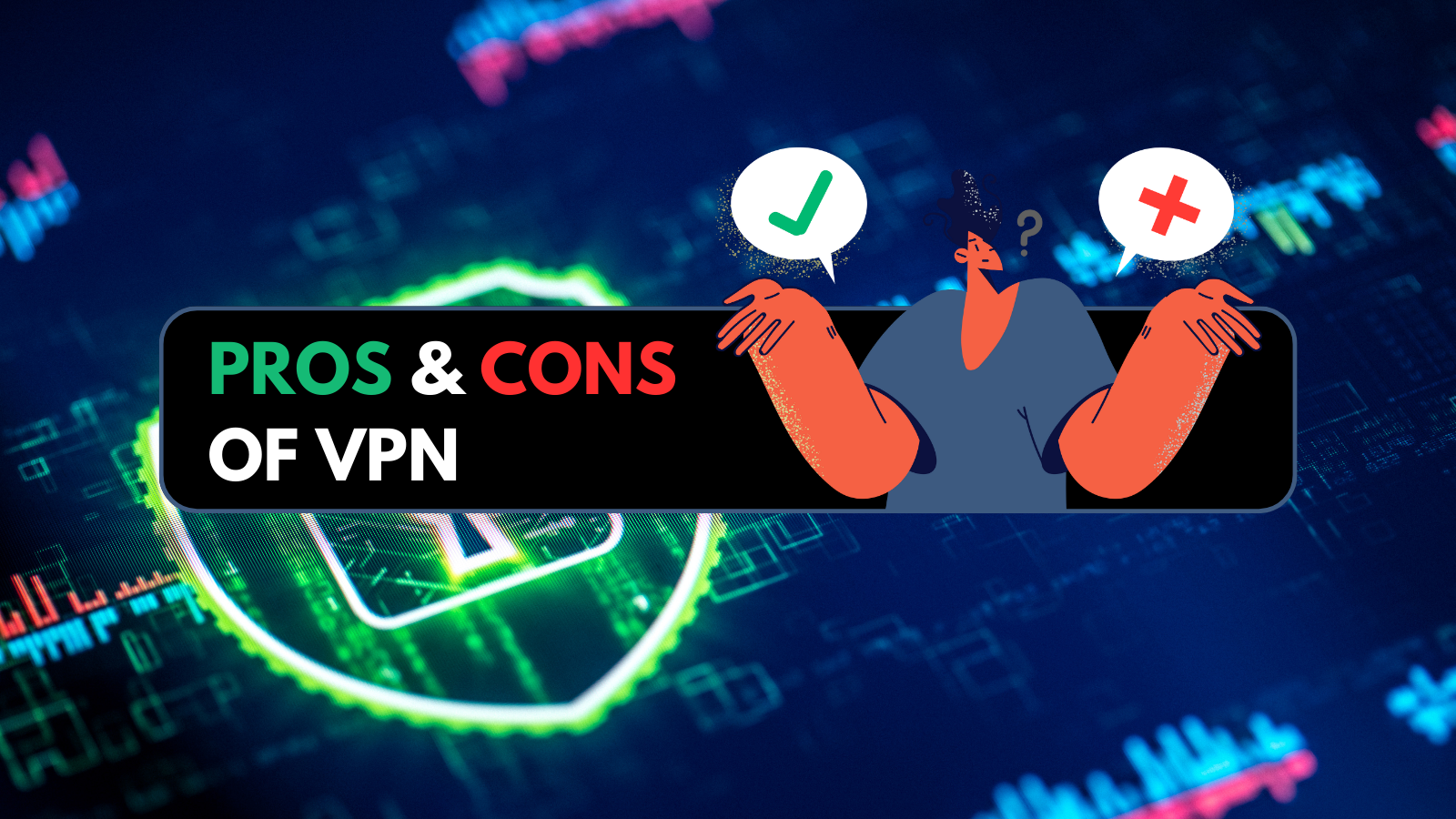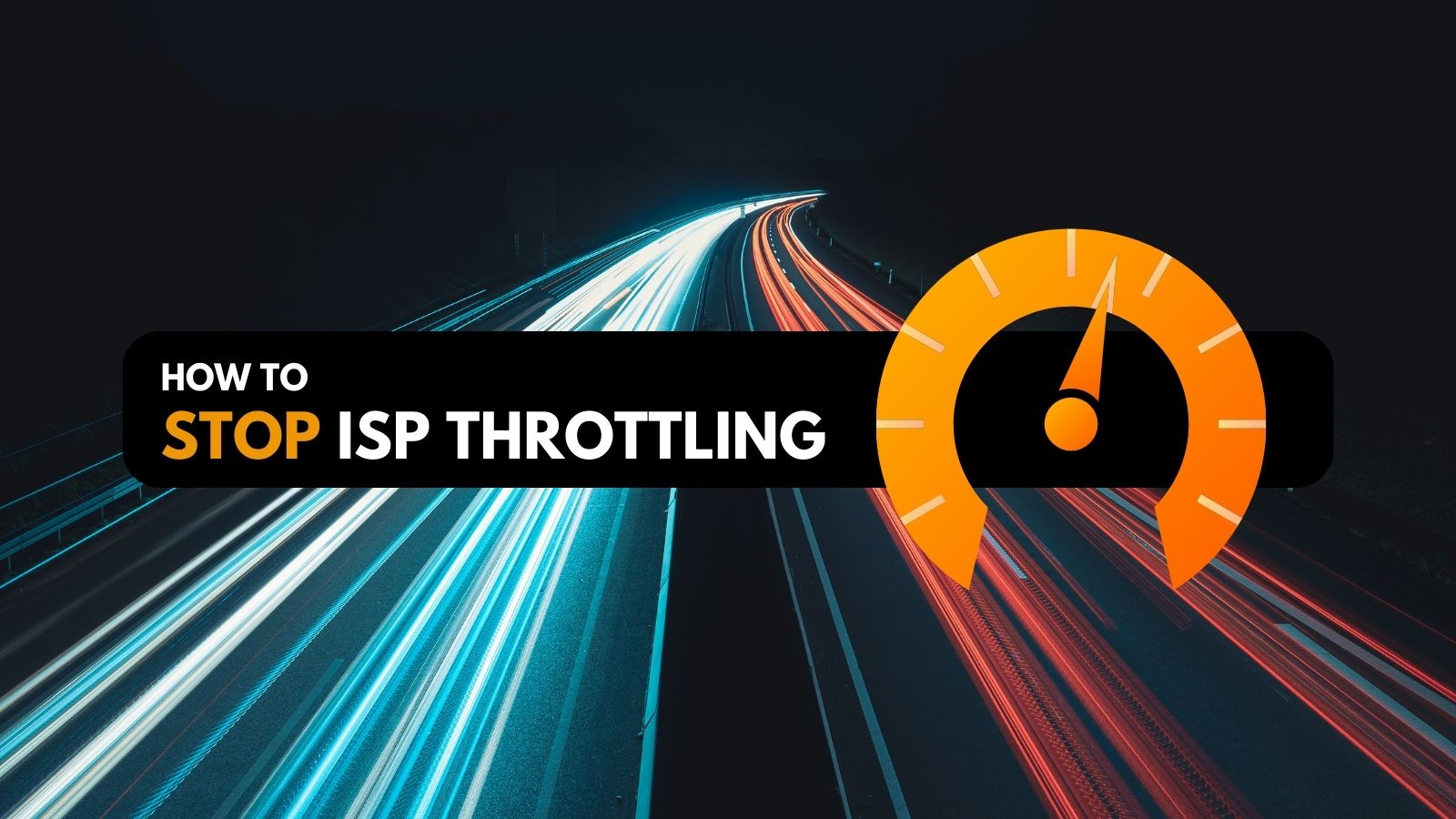
When you purchase through links on our site, we may earn an affiliate commission. Here’s how it works.
5 Eyes, 9 Eyes, and 14 Eyes Alliance
The Five Eyes, Nine Eyes, and Fourteen Eyes Alliances are often hot topics in discussions about Internet privacy and safe usage. The three alliances comprise several key countries with the common goal of monitoring and sharing mass Internet surveillance data for national security.
Today, these allied countries use sophisticated and invasive methods to collect data from their citizens. These efforts include, but are not limited to, tapping key infrastructure, using proxies to gather intelligence, and working directly with local Internet service providers (ISPs) to access logged data.
A foolproof way to keep your Internet activities safe from the prying eyes of government agencies is to use a capable VPN that is headquartered outside the allied countries.
In this article, we will discuss the history and current operations of the alliances and explain how their existence impacts you. You will also learn different ways of keeping your sensitive data safe online.
What Are the 5 Eyes, 9 Eyes, and 14 Eyes Alliances?
5 Eyes, 9 Eyes, and 14 Eyes Alliances are collaborative efforts by different governments to monitor and share their citizens' private Internet and communication data.
The first of these alliances was the Five Eyes Alliance (also known as FVEY), which was formed shortly after World War II and consisted of Canada, the US, Australia, New Zealand, and the UK. FVEY has always been shrouded in secrecy, and its existence wasn’t made public until 2005.
The original Five Eyes Alliance later expanded into the Nine Eyes Alliance with the addition of France, the Netherlands, Denmark, and Norway. Eventually, the Fourteen Eyes Alliance was formed after five more countries were added, including Belgium, Italy, Spain, Sweden, and Germany.
Today, countries in these alliances collaborate to varying degrees and gather mass surveillance data by tapping key infrastructure. So, what does this mean for you? Well, for example, your Internet service provider continuously logs your activity and allows government agencies to access that data.
Many intelligence alliances are typically based on a barter system. Five Eyes, Nine Eyes, and Fourteen Eyes are unique in that they allow a free flow of information instead of requiring an exchange of data.
What’s concerning is that these alliances are still expanding and could potentially include other countries in the future. Possible candidates include Japan, South Korea, Singapore, and India.
Differences Between the 5 Eyes, 9 Eyes, and 14 Eyes Alliances
Generally, the Five Eyes is considered to be the strongest due to a formal agreement between its members. However, the other alliances also regularly assist with intelligence gathering and sharing. Third-party contributors, consisting of friendly countries, also play a key role in making global mass surveillance possible.
Let us look at the details of each of these alliances and their different third-party contributors.
Five Eyes Alliance
The Five Eyes Alliance consists of five countries:
- United States of America
- United Kingdom
- Canada
- New Zealand
- Australia
Countries that are a part of the Five Eyes are under an agreement to share signals intelligence (SIGINT) with each other. This can include communication intelligence (Internet activity, emails, text messages, and phone calls) and electronic intelligence (signals from surface-to-air missile systems and radars).
The original purpose of FVEY was to gather counter-intelligence data against the Soviet Union after the Second World War. However, the alliance’s objectives evolved with a change in the international political landscape and the start of the war on terror.
Today, NSA (in the US) and GCHQ (in the UK) mainly direct their mass surveillance activities toward adversaries like Iran, Russia, and China. The other FVEY countries assist in the surveillance. That said, recent reports say that the US might be excluded from this alliance, due to the country's current position on withholding data from Ukraine.
Nine Eyes Alliance
The Nine Eyes Alliance consists of four additional countries on top of the countries present in FVEY:
- France
- Denmark
- Norway
- The Netherlands
The main goal of the Nine Eyes was to further build upon the intelligence-sharing network for national security. The additional countries in this alliance act as third parties and do not have a formal treaty with SIGINT agencies.
Hence, little is known about their official roles in the alliance. However, even though they are third-party participants, it’s important to remember that these countries are not exempt from mass surveillance.
Fourteen Eyes Alliance
The Fourteen Eyes further extend upon the Five Eyes and Nine Eyes Alliances by adding additional states collectively known as SIGINT Seniors Europe (SSEUR). This consists of the following countries:
- Germany
- Italy
- Spain
- Belgium
- Sweden
Like the Nine Eyes, the exact details of the agreement between the Fourteen Eyes and Five Eyes are unknown. What we do know is that countries in SSEUR regularly collaborate with FVEY to share and receive intelligence data. However, since they do not have a formal agreement, their level of responsibilities and rights in the alliance is unclear.
Third-Party Contributors
Several additional countries are suspected to be third-party contributors to the surveillance conducted by the Fourteen Eyes.
Possible third-party contributors include the NATO countries like:
- Greece
- Romania
- The Baltic States
- Hungary
- Iceland
- Other European nations
Countries that are generally globally allied among each other are also suspected to enable mass surveillance by the Fourteen Eyes. These include:
- South Korea
- Japan
- Singapore
- Israel
The History Behind the 5 Eyes
As previously mentioned, the 5 Eyes is not new—its history dates back to World War II. The alliance has matured over the last few decades, and its focus has constantly shifted from one target to another.
Let’s take a look at the brief history of the 5 Eyes Alliance and see where it stands today:
- In 1946, the United States and the United Kingdom signed an intelligence pact called the UKUSA Agreement. Soon after that, New Zealand, Australia, and Canada also joined, resulting in the birth of the Five Eyes Alliance.
- Members of the Five Eyes worked closely during the Cold War to share and intercept intelligence data on the Soviet Union using the ECHELON surveillance system.
- Overtime, ECHELON evolved, and the focus shifted towards new threats. For instance, it played a significant role in foiling terrorist threats after the 9/11 attacks on the Twin Towers. During the war on terror, ECHELON's main targets were countries like Saudi Arabia, Afghanistan, Iraq, and Syria.
- In the last decade, China has been among the main targets of the surveillance system because of its rising global influence. Five Eyes countries heavily compete with China in trade, manufacturing, and international relations.
- Similarly, in recent times, Russia has once again become a prime focus of surveillance by the Five, Nine, and Fourteen Eyes Alliances after its invasion of Ukraine in 2022.
- Today, countries in these alliances also spy on their own citizens by using each other as proxies to avoid breaking local privacy laws. Edward Snowden's 2013 revelations showed that the British GCHQ and the NSA in the US actively spy on their citizens using unlawful tactics.
What Information Do These Alliances Collect?
The Five Eyes, Nine Eyes, and Fourteen Eyes Alliances collect and store your online activity data such as your search history and the websites you visit. They also track your emails, phone calls, video calls, and private messages based on data extracted from your ISP, online tracking tools, and other third-party methods.
Theoretically speaking, the purpose of collecting this data is to maintain national security. The NSA has indeed foiled many international terrorism threats and caught criminals on the dark web using these surveillance tactics.
However, let us not forget that the privacy of average citizens is also at risk here. Agencies have been exposed in the past for using unlawful methods of spying on their citizens. For instance, Edward Snowden leaked classified documents and exposed the NSA for collecting bulk phone records of American citizens as part of its surveillance program. These actions were later found to violate the Foreign Intelligence Surveillance Act and ruled unlawful.
Instead of illegally collecting their own intelligence data, FVEY countries ask other allied agencies to run surveillance programs externally and share the gathered data. This loophole allows countries to spy on their citizens without breaking local privacy laws. Such use of proxies extends to all alliance members, which means that your privacy could be at risk if you live in any of the allied countries.
What’s surprising is that the Five Eyes countries can also tap your phone lines. Under the Patriot Act enacted after the 9/11 attacks in the US, tapping phones is legal. Over the last few years, several attempts have been made to restrict such access, but the surveillance still continues to this day.
How to Protect Yourself from 5 Eyes, 9 Eyes, & 14 Eyes Alliances
Even if local privacy laws in your country protect you, nobody can guarantee that the government is not using foreign agencies or proxies to spy on you. Nowadays, the Internet and social media are a big part of our lives, so online privacy is of prime importance.
Fortunately, there are several safety precautions you can take to avoid the mass surveillance tactics of the 5 Eyes, 9 Eyes, and 14 Eyes Alliances. So, let's discuss each of these methods in detail.
Using a VPN
A VPN hides your IP address and protects your online data using various security protocols. VPNs route your Internet traffic through their secure servers and temporarily assign you a different IP address that cannot be tied to you.
However, some VPNs will log your actual IP address and Internet activities. If these VPNs are located in one of the Fourteen Eyes countries, they might be liable to share logs with government agencies. Here are some examples of such occurrences:
- IPVanish – According to court records revealed in 2016, IPVanish (a US-based VPN service) handed over user activity data to the FBI. However, the service has denied these accusations, stating that it has a strict no-logs policy.
- Riseup – This US-based email and VPN provider got silenced by the FBI with a gag order and complied with two warrants in 2017.
- HideMyAss – This UK-based VPN provider is very transparent about handing over data to third parties. However, the company claims that it does not sell data directly tied to its users.
- Lavabit – Lavabit shut down its operations in 2013 after receiving an order from the US government to give them its SSL private keys to spy on Edward Snowden.
- PureVPN – Reports suggest that this company provided user data to the FBI in 2017, which led to the FBI tracking down an Internet stalker, even though PureVPN supposedly has a strict no-logs policy.
To efficiently secure your Internet activities, you need a capable VPN based outside of the Fourteen Eyes countries. Additionally, the best VPNs employ military-grade encryption and strong security protocols to ensure your identity is protected online.
Only a few VPNs meet all the necessary criteria. NordVPN is our top recommendation for hiding your data from the Fourteen Eyes Alliance and its intelligence agencies. It's among the most secure VPNs, powered by high-end protocols and tough encryption. Plus, it goes through regular audits to prove that it collects zero personally identifiable data.
Using an Anonymous Email and Alias
An anonymous email address or an alias can help you shield your identity on the Internet. Anonymous emails cannot be traced or tied to you. Furthermore, quality anonymous email services encrypt the emails, which means no one can view their content, even if they get intercepted during delivery.
ProtonMail is a popular secure email service that uses end-to-end and open-source encryptions like AES, OpenPGP, and RSA. You can also choose from many other options, such as Mailfence, Tutanota, and CounterMail.
If you are not using an anonymous email service, another good option is to use an alias online, which is essentially an assumed name. However, using an alias is situational and may not be desirable in professional settings.
Using a Burner Phone to Register for Services
We highly recommend using a burner phone when registering for non-essential services on the Internet, especially those suspected of logging and/or sharing user data. This helps secure your privacy because the burner number is not related to your identity in any way.
Burner phones also come in handy when purchasing goods from strangers on Facebook or Craigslist. Since you will dispose of the burner number after using it, you will not become the target of scam calls or spam advertisements in the future.
It is not recommended to use a burner phone for essential services that require your phone number as an added security measure because you may lose access to your accounts permanently. This includes services like iCloud, Google, and other similar accounts.
Using Encrypted Messaging Services
Standard SMS texting doesn’t use encryption, so it can be monitored by anyone looking to listen in on your private conversations. Encrypted messaging services require encryption keys to read messages’ content, and no one other than the sender and recipient will have this key.
Some messaging services that claim to support end-to-end encryption include WhatsApp, Wickr, and Signal. The most prominent one is WhatsApp, which is owned by Facebook.
From Snowden's leaks, we already know that the NSA has collected communications data from tech companies in the US like Facebook. This means that so-called “encrypted” services like WhatsApp could also potentially leak information. For instance, the FBI was able to recover Signal and WhatsApp data from Trump's attorney's phone in 2018.
Using a Privacy-Focused Browser
Using the Tor browser might be your best bet if you want maximum online protection. It is a good choice if you want to avoid fingerprinting on the Internet, as long as you use Tor’s standard settings. If you don’t install add-ons and stick to the default window sizing, it will be nearly impossible for someone to create your digital fingerprint.
Regardless of the browser that you are using, it is essential to follow some good privacy practices, such as:
- Deleting all your saved passwords
- Disabling browser cookies
- Using incognito mode when browsing
- Keeping the browser updated
- Using default settings to avoid fingerprinting
Avoiding Sharing Personal Information
This one might seem like a no-brainer, but it is best practice to avoid providing personal information to people or services you do not fully trust.
Using an alias is a good way to hide your actual name in many scenarios. To minimize sharing sensitive data, you can also use throwaway email accounts, assumed addresses, and burner phones when registering for non-essential services.
These methods ensure the safety of your personal information even if the service provider leaks it to government agencies—or in the case of a data breach. Limiting what you share online can keep you safe from stalkers and reduce the risk of getting doxxed, especially on social media platforms and online marketplaces.
Final Thoughts
Government agencies in Five Eyes, Nine Eyes, and Fourteen Eyes Alliance countries regularly collaborate with ISPs and big tech companies like Google, Meta, and Twitter to spy on citizens. Alliance members also tend to bypass their local privacy laws by using their allies as proxies to get their hands on mass surveillance data. So, your sensitive information may not be private if you reside in any of the Fourteen Eyes countries.
Using a high-security VPN is the best way to protect your data from surveillance, in addition to using an encrypted messaging platform and following secure browsing practices. We recommend NordVPN because it’s the most capable VPN on the market. It offers military-grade encryption and supports the latest and greatest security protocols, so you can trust that your online activities will remain private.
That’s all we have prepared for this guide. If you have any questions, you can drop a comment below. Thanks for reading!

